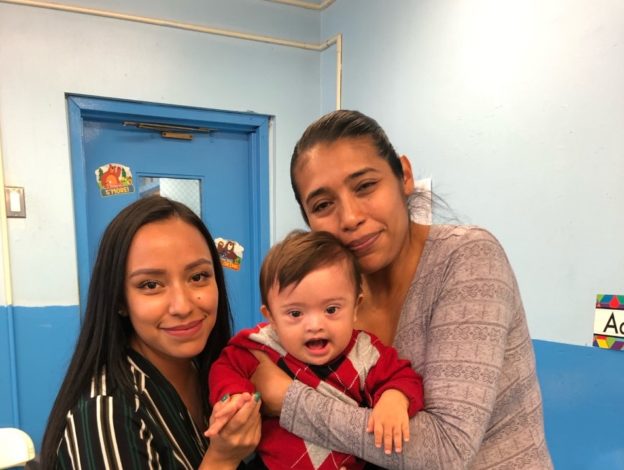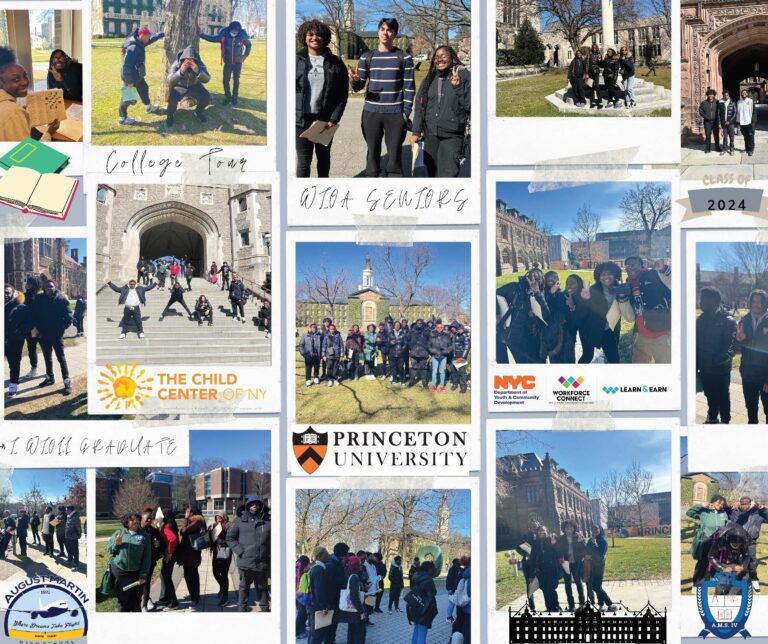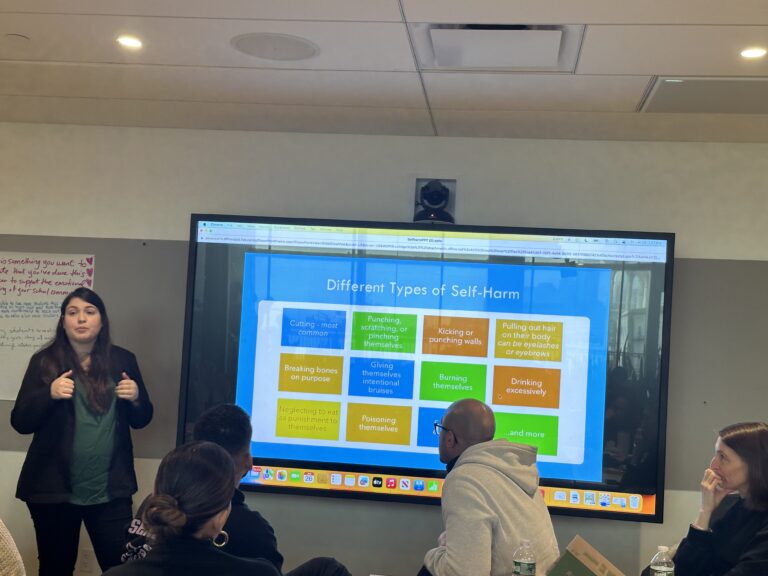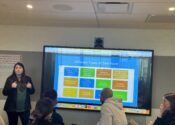A linchpin of our Early Head Start program, home visitors play a crucial role in helping clients strengthen the parent-child bond and increase school readiness where it begins: the home. They work with low-income families with babies, toddlers, and pregnant women, using the ParentChild+ home visiting model and curriculum. These dedicated professionals show parents how they can help their children learn, grow, reach developmental milestones, and feel confident and safe.
Alondra Santiago has served as a home visitor at The Child Center of NY for three years — and wouldn’t have it any other way.
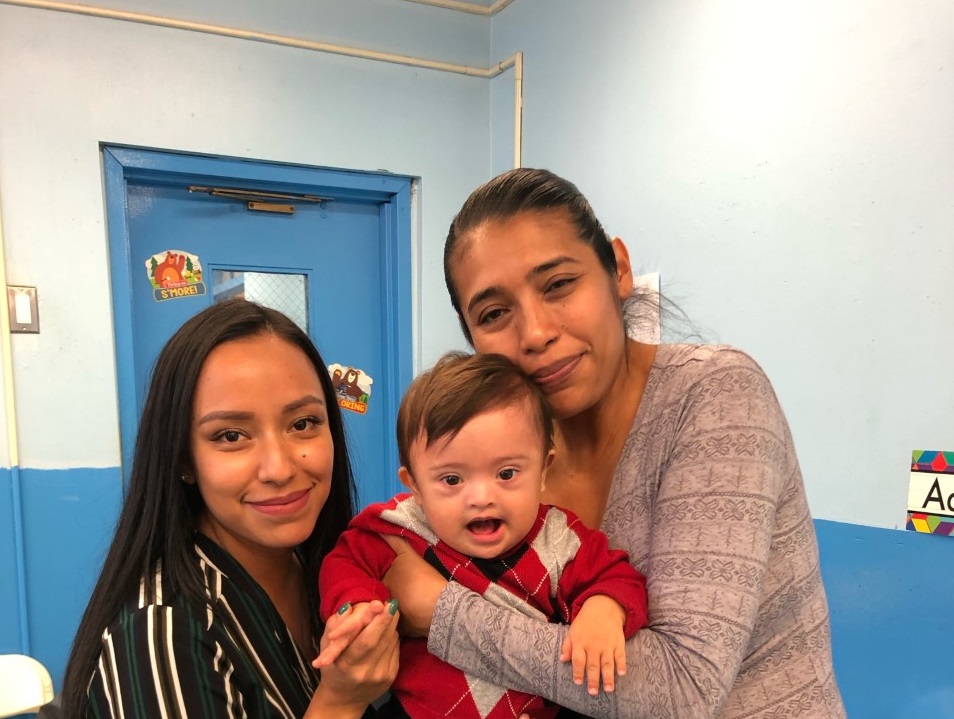
Alondra (left) with clients Isaías and his mom Rosalba
How did you get involved in this line of work?
I’ve always felt good about helping others and wanted a career in which I could help those in need on a daily basis. Before I came to The Child Center, I held jobs as a youth care worker helping children at the border and as an assistant teacher at a day care center. In both of these jobs, I had a growing sense that working with just the children was not enough; I wanted to work with the family as a whole to have a greater impact. That is exactly what The Child Center does, and when I saw an opening here, I knew it was an opportunity I wanted to pursue. I was familiar with The Child Center because my son attended its Early Head Start program, and he is now 15!
Early Head Start home visitors are required to have experience in child development and early childhood education, which I had. I applied, and I’m so glad I did. Working here has led me to help more and become a supportive figure to families in need.
Home visitors are now also required to have Child Development Associate (CDA) certification or equivalent coursework, which The Child Center is helping me work toward.
Can you share a memorable experience that really captures your work at The Child Center?
There are so many! I’ll share a recent one about a mom, Rosalba, and her son, Isaías, whom I met on the bus on my way to work. When I told Rosalba about our program, she seemed interested but also skeptical. With a worried look on her face, she said, “I have to be honest with you, my child has Down syndrome. Will you still accept my child?” I assured her that we work with all families and are here as a program to support her. With excitement, we enrolled her and her child, and I was able to serve as their home visitor.
With every family, we work on strengthening the parent-child bond and school readiness. We provide free books and educational toys and give them guidance on how they can support their children’s physical, social, emotional, cognitive, and language development—in other words, how they can help their children live up to their potential, now and in the future. “School readiness” for Isaías, as a child with Down syndrome, also means coaching his mom to teach Isaías how to develop his social skills, communication, and his many wonderful qualities and abilities; all of Isaías’ learning will begin from home, at his pace and development. It means encouraging Isaías to become an independent learner, and guiding his mom to encourage this in him as well. By recognizing how to support her son at his own pace, she will be able to help him succeed in school to the best of his abilities.
In addition to the general objectives of bonding and school readiness, parents also have specific family goals. One of Rosalba’s goals was working on attachment issues with her son. Usually when we think of attachment issues, we think of the need to strengthen the child’s attachment to his primary caregiver. This wasn’t the case with Isaías. In this case, Isaías already had a wonderfully secure attachment to his mom. However, he was not comfortable with anybody else; Rosalba wanted to work on his being able to “attach” to other people. This is an essential skill for school — the ability to feel comfortable with other adults and children — and it also would allow Rosalba time for herself, which she was lacking.
At first Isaías wouldn’t want to leave his mom’s arms, but after several attempts of practicing, he soon grew comfortable coming to me. “Socializations” also helped. These are twice-monthly groups of 10 to 12 families socializing and engaging together in activities such as reading stories and painting. They take place in a classroom setting and follow a preschool-like structure, with transitions from one activity to another.
Another of Rosalba’s goals was to teach Isaías how to be able to blow out the candle on the cake at his first birthday party. We worked on strengthening Isaías’ oral-motor skills, essential not only for blowing but also for speech. In the end, Isaías enjoyed his birthday party very much, but he was more interested in taking pictures with his guests than blowing out the candle! Rosalba told me he’s loved very much by so many friends and family, and has made so much progress with us. She feels blessed for that. Isaías has shown vast improvement, and it’s been an unforgettable experience being able to help Rosalba and her son.
What would you tell someone who is considering becoming home visitor?
I would tell them to do it! The parents I work with want what we all want for our children: for them to start school ready to learn at the level of their peers, and to be able to support their children’s development on their own. We help make that goal a reality. Children who might otherwise start school behind truly do get a “head start” with us. The work we do is very rewarding and it’s so great to see families come together and be much happier.
What’s the best part about working as a home visitor at The Child Center of NY?
The best part about working at The Child Center is I’m able to personally see families build a stronger, healthier relationship with their child. I’m able to be a part of something special. We are the ones that help the children of tomorrow become better academically and provide a foundation for a better well-being.
The Child Center is also just a great place to work. I feel extremely supported by the agency, and my supervisor, [Early Head Start Assistant Director] Stephanie Baez, always encourages me to continue my education and grow. The agency itself has allowed me to grow with all the training and guidance provided. And my families help me grow. Each home has its own unique environment since each family situation is different. It’s like I never have the same experience twice. The children and families are always learning, and I’m always learning too.
